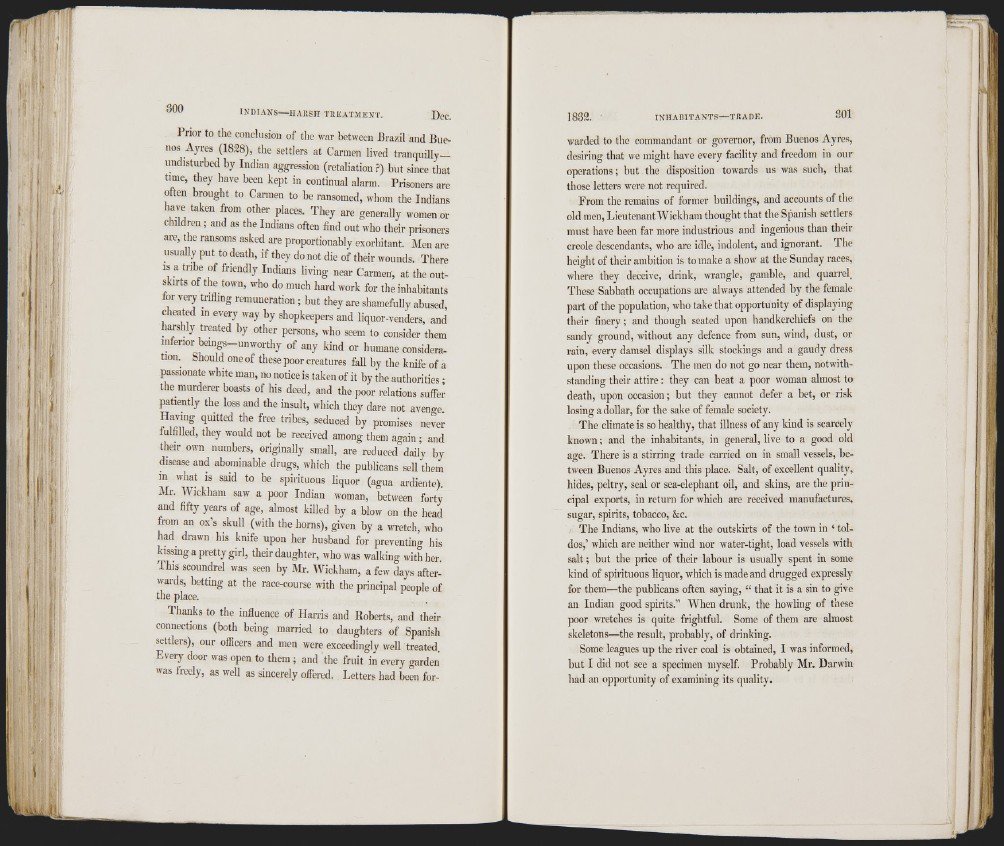
I i
? 1
t i t
\ I
Prior to the conclusion of the war between Brazil and Buenos
Ayres (1828), the settlers at Carmen lived tranquilly__
undisturbed by Indian aggression (retaliation.?) but since that
time, they have been kept in continual alarm. Prisoners are
often brought to Carmen to be ransomed, whom the Indians
have taken from other places. They are generally women or
children ; and as the Indians often find out who their prisoners
are, the ransoms asked are proportionably exorbitant. Men are
usually put to death, if they do not die of their wounds. There
IS a tribe of friendly Indians living near Carmen, at the outskirts
of the town, who do much hard work for the inhabitants
for very fr-ifling remuneration ; but they are shamefully abused,
cheated in every way by shopkeepers and liquor-venders, and
harshly trrated by other persons, who seem to consider them
inferior heings-unworthy of any kind or humane consideration.^
Should one of these poor creatures fall by the knife of a
passionate white man, no notice is taken of it by the authorities •
the murderer boasts of his deed, and the poor relations suffe^
patiently the loss and the insult, which they dare not aven-re
Having quitted the free tribes, seduced by promises never
fulfilled, they would not be received among them again ; and
their own numbers, originally small, are reduced daily by
disease and abominable drugs, which the publicans sell them
in what is said to be spirituous liquor (agua ardiente)
Mr. Wickham saw a poor Indian woman, between forty
and fifty years of age, almost killed by a blow on the head
from an ox’s skull (with the horns), given by a wretch, who
had drawn his knife upon her husband for preventing his
kissing a pretty girl, their daughter, who was walking with her.
This scoundrel was seen by Mr. Wickham, a few days afterwards,
betting at the race-course with the principal people of
the place. ^
Thanks to the influence of Harris and Roberts, and their
connections (both being married to daughters of Spanish
settlers), our officers and men were exceedingly well treated
Every door was open to them ; and the fruit in every garden
was freely, as well as sincerely offered. Letters had been forwarded
to the commandant or governor, from Buenos Ayres,
desiring that we might have every facility and freedom in our
operations; hut the disposition towards us was such, that
those letters were not required.
From the remains of former buildings, and accounts of the
old men, Lieutenant Wickham thought that the Spanish settlers
must have been far more industrious and ingenious than their
creole descendants, who are idle, indolent, and ignorant. T he
height of their ambition is to make a show at the Sunday races,
where they deceive, drink, wrangle, gamble, and quarrel.
These Sabbath occupations are always attended hy the female
part of the population, who take that opportunity of displaying
their finery ; and though seated upon handkerchiefs on the
sandy ground, without any defence from sun, wind, dust, or
rain, every damsel displays silk stockings and a gaudy dress
upon these occasions. The men do not go near them, notwithstanding
their attire : they can beat a poor woman almost to
death, upon occasion; but they cannot defer a bet, or risk
losing a dollar, for the sake of female society.
The climate is so healthy, that illness of any kind is scarcely
known; and the inhabitants, in general, live to a good old
age. There is a stirring ti-ade carried on in small vessels, between
Buenos Ayres and this place. Salt, of excellent quality,
hides, peltry, seal or sea-elephant oil, and skins, are the principal
exports, in return for which are received manufactures,
sugar, spirits, tobacco, &c.
The Indians, who live at the outskirts of the town in ‘ toldos,’
which are neither wind nor water-tight, load vessels with
salt; but the price of their labour is usually spent in some
kind of spirituous liquor, which is made and drugged expressly
for them—the publicans often saying, “ that it is a sin to give
an Indian good spirits.” When drunk, the howling of these
poor wretches is quite frightful. Some of them are almost
skeletons—the result, probably, of drinking.
Some leagues up the river coal is obtained, I was informed,
but I did not see a specimen myself. Probably Mr, Darwin
had an opportunity of examining its quality.